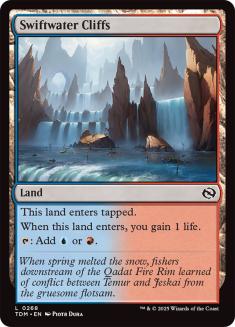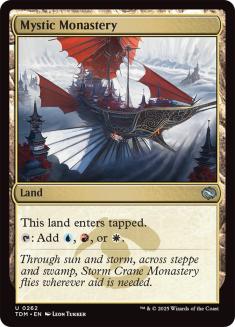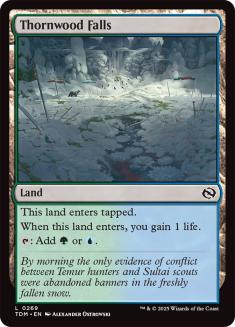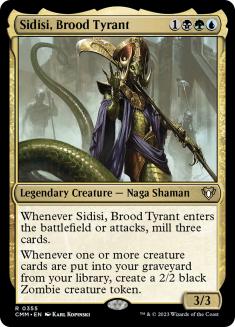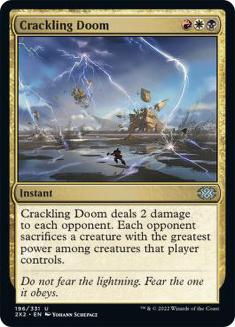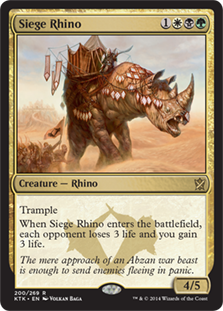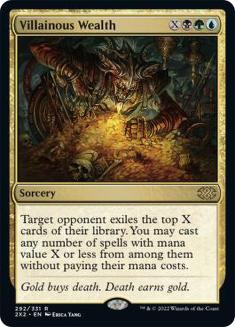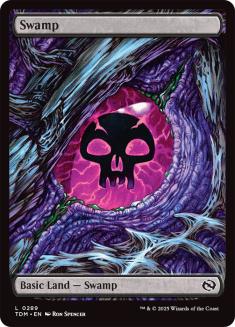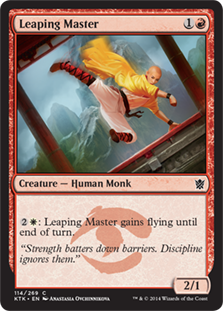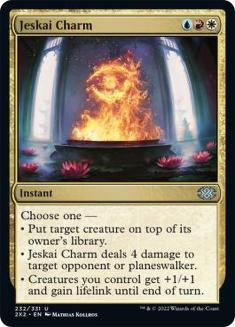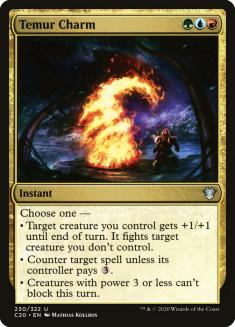I would be remiss not to cover the Draft portion of this event, where the four members of my Pro Tour team finished 1st (Seth Manfield), 10th
(Steve Rubin), 15th (Frank Skarren), and 17th (me) with a total record of 23-3-1 in Draft.
The format is still the same as it was. Take the good cards that come to you, and if there aren’t lands to support them all, find the open lane. I executed
this to a 2-1 Abzan splash red deck in the first pod and a full on 3-0 Five Color Special in the second pod.
The big lesson for me in this event was the power of drawing first. Obviously, if your deck has all the pieces being on the play is far superior, but if
you are missing the proper mana or card advantage in a matchup where it is important, being on the draw is insane. In addition, the land-drop intensive
nature of the format means that mulligans on the play are nearly lethal, as it’s hard to have the right mix of lands and spells in a full seven, let alone
a handicapped one. I lost my one match to Tom Martell partially because I failed to realize I wanted to draw first in game 3, and in the second draft my
five color deck with slightly poor mana was on the draw every single game and loved it.
The secondary lesson was to always ensure you have a trump. My Five Color deck had ways to win games that extend higher in scale, including Villainous
Wealth, but the Abzan deck was too short on options for a deck that played fairly defensively. Even something as simple as a Bitter Revelation to pull
ahead down the stretch would have been huge. As it was, I just had the fragile (but excellent) Ankle Shanker and Abzan Falconer to break stalls and Dead
Drop to put away attrition battles. The other reason I lost to Tom was that his deck was positioned to fight grindy matchups, and I was Treasure Cruised
right out of two games with little way to fight back.
As for that deck, let’s play the sample hand game:
Never let anyone say I have any kind of discipline whatsoever in this format. Yes, that is all five clans of tri-color cards. There were even more awkward
basics where that came from, coming to a total of 4 Forest, 3 Island, and 2 Swamps.
How did this happen?
Pack one I started on Jeskai Windscout over Mardu Hordechief and Sultai Ascendancy, as it’s what I felt was the best linear build around card. A Mystic
Monastery and Jeskai Charm later I thought I knew where things were going, but I ended up seeing a bunch of Temur cards including one of each on-color gain
land. I assumed I would be Temur splash white for the Charm at this point and proceeded with that in mind.
Then pack two, I saw a second pick Sidisi, Brood Tyrant where the next best card in the pack was a Frontier Bivouac. This would seem obvious, but I already
had so much on-clan fixing I figure there was a high payoff at low cost if Sidisi panned out. I was then passed two more Jeskai Charms and a Temur Charm,
then opened Siege Rhino and couldn’t help myself. The fact that the card was stamped with a heart did not make exerting self-control any easier. I ended up
a little short on black fixing, and having to play a Banner or two to make things work out, but with my cards’ power level and the Villainous Wealth,
flooding didn’t seem like an issue.
Which brings me to my last point: Bloodfire Mentor and Abomination of Gudul are the truth. They are the card management spells that interact with the
board. The biggest things to manage in a Five Color deck are winning through mana flood and having easy early plays, and these cards each do both. Given
how much you can slow down a game in this format, even a bad Merfolk Looter is still a good enough Merfolk Looter.
Morphs and Morality
The last two weekends of Grand Prix, I’ve had a match end with a judge ruling.
In New Jersey, my opponent activated Sensei’s Divining Top as Ponder, putting two back on top and one into his two card hand of Batterskull and an unknown
card. We both agreed on which card it probably was out of his hand, but as it touched his other cards it was ruled game loss. This seems clear cut given
current policy, but in game 1, basically the exact same scenario occurred the other way around. I had turboed through my second turn as soon as I realized
he was on Miracles, and after fetching, noticed an extra, upside down Brainstorm in my hand. I assumed the relevant point was that it was physically
obvious which card was the accidental inclusion and continuous demonstrated this by pulling the card aside in showing what was going on, which in turn was
misinterpreted by the judges as the card not touching my hand. As a result of this chain of events, I only received a warning for essentially the exact
same penalty that should have been a game loss. Justice prevailed and I lost that game 2 turns later to Terminus on my Delvers with my handful of lands,
but the result of this match was somewhere between awkward and extremely awkward.
In Ottawa, I lost a game 3 on day one. I extended the hand, packed up my cards, and my opponent picked up his. I noticed the morph he had in play touched
the rest of the pile of scooped graveyard, lands, and hand, and I called a judge as soon as he clearly had failed to reveal. Again, the morph was most
likely the top card, but it was clear he failed to reveal and the penalty was applied according to policy.
In the first case, I actually felt bad about the events that happened. In the second, it was simply a win.
If I ever win a match of Magic I legally played and feel bad about it, well, I would say I did something wrong, but more likely that just wouldn’t happen.
I guess there’s some feel bad when it’s you versus a teammate for top 8, but if my opponent gets a game loss or just mulls five times in two games, you
will get a “Better luck next round” out of me, which I genuinely mean at the least due to tiebreakers. That’s the game you signed up to play, and sometimes
you spin the variance wheel and hit Bankrupt. Obviously winning a match that was fair and close is more rewarding than the free roll, but a win is a win
and that’s what I came for.
If something legitimately got messed up during a match (i.e. the first scenario with the mismatched rulings) and the result of the match was not something
that should have happened within the rules, that’s definitely a reason to feel awkward about it. But again, mistakes happen and things are resolved to the
best of the judge’s ability. If you don’t like the policies that lead to the rulings that occurred, take action to change them, but there’s nothing you can
do until that change happens.
Of course, your mileage may vary, and as I said, if you feel bad after a match you won, you are probably doing something wrong. It’s on you to figure out
how to resolve that for yourself, but when I am legally handed a win I’ll take it. A punt is a punt.
Aside on Morphs
The current state of the Morph revealing rules is fairly absurd to me and has been since day one. It feels like someone looked at a rule last used in 2007,
saw that it looked close enough, and ran with it without thinking about how much worse it makes events for some people. The situation where an illegal
morph gains an advantage but isn’t noticed involves the card never leaving play and the opponent not pushing for a reveal at end of game. This really feels
a lot like the “paying 3W for a Wrath of God” scenario, where a player makes an illegal play that could be used to gain an advantage, but is fairly easy to
catch, track warnings, and investigate.
Hopefully this is reviewed and changed, but until then, just do something that makes sure it doesn’t happen. The best option I’ve found is still unsleeving
morphs as you play them and resleeving on the flip, ensuring that even if you do forget the card is still without a doubt the morph in question. The token
overlay is nice, but I’ve honestly almost forgot and needed the extra layer of unsleeving.
Logical Emotions in Magic
Sorry Todd, I’m pushing into your turf this week.
The subject of managing emotion and logic in Magic is an odd one for me. I’m obviously known for being an over-the-top character a lot of the times, and I
make a lot of plays based on feel, but on the flip side I like to create fixed methodologies for approaching matches and am extremely systematic and
procedural when testing.
So, similarly to how I approach formats, I’ve stumbled into a healthy mental framework that works for me and backed out the logic as to why it does.
Let’s get the big one out of the way.
A lot of people subscribe to the idea that getting excited about wins and good records and down about losses is just a way to get distracted. You can be an
emotionless robot, play every match and win, lose, or draw the same way. I’m pretty sure this is a giant trap that that they fall into and don’t get out
of.
What is your end game of this? Win as much as possible, continue on? If your goal is solely to mind numbingly play a card game to amass the spoils of
victory, the cards with dinosaurs on them are definitely a worse option than the ones with numbers and suits. That said, Magic is definitely unique in how
much it changes between matches and events, while other games remain relatively static, so I can’t fault someone who is bored out of their mind playing
higher EV games for opting for Magic so they don’t gnaw their arm off, but that’s about where I see the line as being drawn.
You have to have some amount of fun actually playing the game. Otherwise, what are you actually doing here?
The next natural progression here is getting excited about wins and being stonefaced about losses, but changing the whole positive-negative dynamic to
positive-neutral eventually starts turning sour and basically becoming a positive-negative after your expectations shift.
This is where the whole “love to win and learn from losing” comes into play, and it works pretty well. Winning is obviously better, but losing means you
win more in the future so that’s also fine. Because both outcomes are good in some way and learning from losing takes a lot of mental effort, you are
distracted enough and able to feel a bit good about every match.
Except unintentional draws, because those are just terrible, and the only real lesson is to feel bad nine out of ten times they happen so that you never
have one occur where you weren’t scrapping your way to a match point with every chump block you could muster.
But in game? For those fifty minutes and potentially five more turns, what are you doing?
If you want Magic to be a puzzle that you can fail to solve every round, that’s fine. Don’t get me wrong, I do my fair share of play pattern development
and thought in between rounds, despite what all my friends will try to say. My side boils down to preferring die rolls to Chess in terms of enjoyment.
This view isn’t without a pitfall, however. The downside is that you can easily take this too far to the point of “I just want to feel something.” This is
where a lot of the classic “degenerate Magic pro” things come from, like the credit card game. The big swings do exist, but having to consistently create
them is not a great place to be. It also doesn’t help that the pay structure of Magic is solid baseline of writing plus windfalls from events, leading
people to budget low and have sudden spurts of money with no real plan for them.
So I take time to really enjoy the small things. Like why there is a fish on Scapeshift, sweating each top deck, or cackling when I attack my opponent with
an 0/5 creature and trigger their stolen Jeskai Ascendancy for lethal.
Even if you disagree with my end result, I can hope you see that there’s a lot of value in figuring out how you want to enjoy the game and executing on it.
Play Magic the way you want to play it, and odds are you will start feeling and doing better while doing it.

